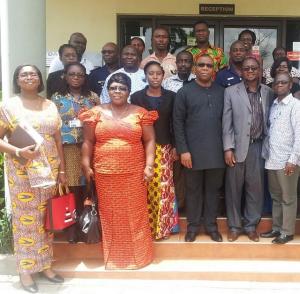Ghana Adopts Food Safety Policy
Ghana adopted a Food Safety Policy on 27 April, 2015 at a Stakeholders Meeting held in Accra ahead of World Health Day 2015 with the theme Food Safety from Farm to Plate. The policy was developed with technical and financial support from the World Health Organization (WHO) and The Food and Agriculture Organization (FAO).
The Stakeholders Meeting was organized by the Food and Drugs Authority (FDA), the coordinator for the development of the Food Safety Policy. In attendance were representatives of the other key stakeholder institutions working on Food Safety issues such as the Ghana Standards Authority, Veterinary Services, Ministries of Health, Trade, Food and Agriculture, Fisheries and Aquaculture Development, Interior, Tourism Culture and Creative Arts and the Academia; University of Ghana, Legon.
The meeting was chaired by the Director of Veterinary Services, it begun with a welcome address by the Deputy Director for Food, (FDA) who also highlighted the objectives of the meeting. The development partners including WHO gave a brief solidarity message and an opening address was given by the Chief Executive Officer (CEO) of the Food and Drugs Authority. The CEO, FDA noted the increasing global food safety concerns and highlighted the food safety challenges being faced by the country. He emphasized that Ghana had shown commitment to address the food safety concerns through the drafting of the food safety policy.
The Food Safety Policy was developed on the basis of a Food Safety Situational Analysis Conducted in 2010 with technical and financial support from WHO. Following the completion of the Situational Analysis WHO and FAO supported the development of the policy with a multi-sector stakeholder technical committee and a team of consultants. The goal of the Nation Food Safety Policy is to bring coordination into the regulation of food safety and define the role of stakeholders to ensure public health and facilitate trade in food. Hence the policy outlines the policy objectives and measures and strategies to achieve the objectives. These include:
- Establish a mechanism for coordinating food safety related activities in Ghana by ensuring harmonization and institutional cooperation among relevant stakeholders
- Review or amend when necessary existing legislation and regulations on food safety to promote harmonization and synergy of legislation
- Enact new laws deemed necessary to promote food safety
- Strengthen the food borne diseases surveillance system including early warning and crises management mechanisms
- Coordinate and strengthen existing laboratories to ensure food safety
- Ensure the provision of appropriate infrastructure for effective food safety management
- Strengthen the mechanism for the provision of food safety information, education and communication
- Develop human capacity along the food value chain
- Encourage the use of Food Safety Management systems
The policy also states the institutional arrangements for implementing the policy, among them the national coordination mechanism and clearly defines the role of all relevant stakeholders.
It is envisaged that the implementation of the food safety policy would enhance food safety throughout the production chain and coordination among all the key stakeholders working on food safety and its related issues.
_______________________________________________
For additional information, please contact:
Technical Contact:
Dr Magda Robalo; Tel.: +233 302-763918; Email: robalom [at] who.int (robalom[at]who[dot]int)
Akosua Kwakye; Tel.: +233 544316011; Email: kwakyea [at] who.int (kwakyea[at]who[dot]int)
Media Contact:
Michelle Thulkanam; Tel.: +233-(0)50-565-7754; Email: thulkanamm [at] gmail.com (thulkanamm[at]gmail[dot]com)-
Ms Joana Ansong: Tel.: +233 544316017 Email: ansongj [at] who.int (ansongj[at]who[dot]int)



